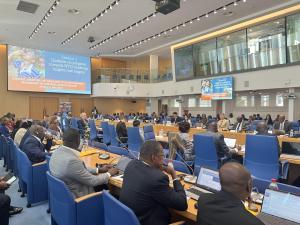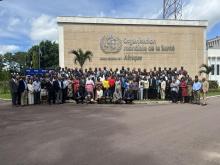Scaling up country support for NTD eradication
Brazzaville - In 2021, the World Health Organization (WHO) unveiled the neglected tropical diseases (NTD) roadmap 2021-2030, initiating a decade dedicated on controlling, eliminating, and eradicating NTDs. The WHO Regional Office for Africa is stepping up support for countries on the implementation of the roadmap to bolster the fight against NTDs and accelerate progress towards attainment of the roadmap targets and goals.
NTDs impose a constant and heavy burden on the poorest, most marginalized, and isolated communities worldwide, with the African Region carrying 39% of the global NTD burden—impacting over 580 million people.
To consolidate progress, the WHO Africa regional office, through the Expanded Special Project for the Elimination of Neglected Tropical Diseases (ESPEN) and the Tropical and Vector-borne Diseases (TVD), organized the NTD Programme Managers meeting. The objective was to discuss challenges, share experiences and opportunities for promoting stronger country ownership for accelerating programmatic action towards the elimination of NTDs.
“COVID19 presented a major setback to the fight against diseases in the continent. Therefore, we need to regain our momentum towards controlling, eliminating, and eradicating diseases by ensuring that domestic resources are mobilized and used for integrated person-centered health services,” says Dr Matshidiso Moeti, the WHO Regional Director for Africa.
In 2021, the number of individuals requiring NTD interventions decreased by an estimated 80 million, a significant milestone. Furthermore, Togo achieved global recognition as the first country in the WHO African region and globally to receive WHO validation for eliminating four NTDs, alongside certification for interrupting dracunculiasis transmission.
The 2023 NTD Programme Managers Meeting addressed key issues such as resource mobilization for funding gaps, and the monitoring of implementation of NTD Master Plans with emphasis on the importance of effective partner coordination at the country level. Recognizing the interconnectedness of human, animal, and environmental health, managers pledged to collaborate with stakeholders to adopt a one-health approach to combating the diseases.
During the 72nd meeting of the WHO Africa Regional Committee, Ministers of Health adopted the Regional Framework for the control, elimination, and eradication of tropical and vector-borne diseases (2022-2030), calling for an integrated and collaborative approach to planning and implementation of interventions, use of data for decision making and building resilient health systems for the elimination of these diseases.
WHO’s efforts to support countries included developing integrated NTD masterplans, promoting strategies like the integrated screening for Skin NTDs, and providing guidance for disease prevention and management. NTD Programme managers were urged to prioritize impact evaluations for evidence generation as a crucial to for guiding interventions toward elimination.




